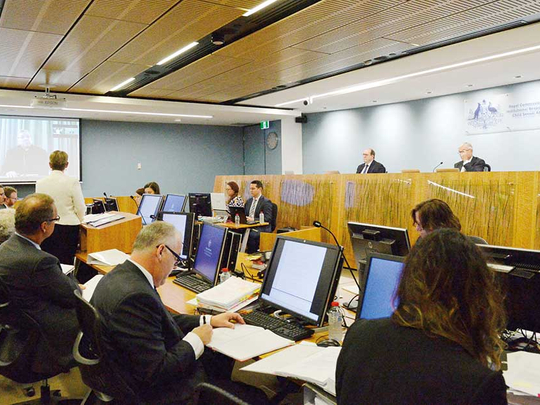
The Australian government’s model for a national redress scheme would exclude children who were abused in Australia’s offshore detention network, a lawyers’ association has warned.
A national redress scheme was one of the key recommendations of the landmark child abuse royal commission, offering a way to compensate survivors without forcing them to resort to costly and prolonged civil action.
The federal government’s model — currently before parliament — differs in several ways from the blueprint laid out by the royal commission.
It proposes a maximum compensation payment of $150,000 (Dh550,856) to survivors, rather than the $200,000 cap, $65,000 average, and $10,000 minimum recommended by the royal commission.
The government has also proposed a requirement that compensation be available only to Australian citizens or permanent residents, except in some cases.
That is at odds with the royal commission’s view that there was “no need for any citizenship, residency or other requirements, whether at the time of the abuse or at the time of the application for redress”.
A spokesman for the Australian Lawyers Alliance, Andrew Morrison SC, warned the proposed restriction would make it all but impossible for those who suffered abuse in immigration detention to seek redress.
Morrison described the legislation as an “unsophisticated and foolish response” to the royal commission’s recommendations, and said there seemed to be a deliberate intent to exclude those in immigration detention.
“If so, it’s a very silly idea, because the whole point of a redress scheme is to encourage people to go the simple route and take a lesser sum of money, than if they go to law and litigate,” Morrison told Guardian Australia. “It’s lengthy, expensive and traumatic for the victims but also for institutions, which include government.”
The government has also expressed a desire to bar those convicted of serious crimes from receiving redress.
It wants to lock out anyone convicted of an offence attracting a maximum sentence of five years or more, saying the measure is needed to protect the scheme’s integrity.
Morrison said the government had failed to recognise the clear relationship between child abuse and later criminal offending. He said the royal commission included no recommendation on barring those with convictions from redress.
“The integrity of the scheme was that everyone would be treated on their merits,” he said. “That victims would be compensated for being victims, not punished for anything else they did elsewhere.”
The redress scheme’s success depends in large part on buy-in from the state and territory governments, some of whom have already expressed their reluctance.
It also asks institutions, including churches, to voluntarily sign up.
Morrison said the government ought to use the charitable status of institutions to encourage them into the scheme.
The inquiry into the proposed redress model is due to report its findings in March.
— Guardian News & Media Limited, London 2018.











